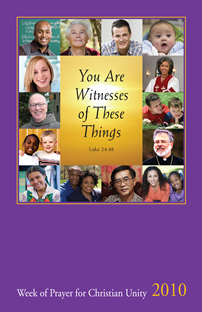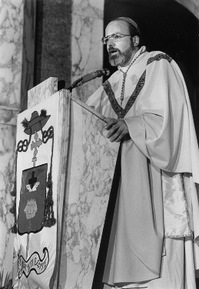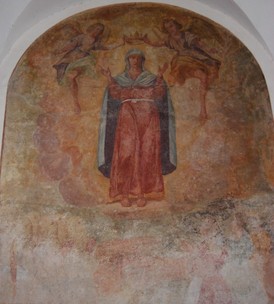Franciscans: August 2009 Archives
Since 1908 the Church has called upon us to join in prayer with other Christians around the world during the Week of Prayer for Christian Unity. We do this work of prayer as an education in hope for spiritual and actual Christian unity realizing that the Holy Spirit is the only one capable of bring unity among various groups of Christians. The proposal for a week of prayer was initiated in the USA by Franciscans of the Atonement Father Paul Wattson and it is held from January 18 - 25. Today the observance is international in scope.
It is generally held that the 1910 World Mission Conference in Edinburgh, Scotland, marked the beginnings of the modern ecumenical movement.

In tribute, the promoters of the Week of Prayer for Christian Unity, the Commission on Faith and Order and the Pontifical Council for Promoting Christian Unity, invited the Scottish churches to prepare this year's theme. They suggested: "You are witnesses of these things" (Luke 24:48).
The 2010 theme is a reminder that as the community of faith those reconciled with God and in Christ, "You are witness of these things"--witness to the truth of the power of salvation in Jesus Christ who will also make real his prayer, "That all may be one...so the world may believe." *Witness gives praise to the Presence who gives us the gift of life and resurrection; by knowing how to share the story of our faith with others; by recognizing that God is at work in our lives; by giving thanks for the faith we have received; by confessing Christ's victory over all suffering; by seeking to always be more faithful to the Word of God; by growing in faith, hope and love; and by offering hospitality and knowing how to receive it when it is offered to us.
Materials to observe the Week of Prayer for Christian Unity are available from the Graymoor Ecumenical and Interreligious Institute, a ministry of the Franciscan Friars of the Atonement.
For more information visit www.geii.org
 25 years ago Capuchin Father Sean Patrick O'Malley was ordained a bishop. Currently he's the cardinal-archbishop of Boston but not before periods of episcopal ministry in the US Virgin Islands, Fall River, Palm Beach.
25 years ago Capuchin Father Sean Patrick O'Malley was ordained a bishop. Currently he's the cardinal-archbishop of Boston but not before periods of episcopal ministry in the US Virgin Islands, Fall River, Palm Beach.
Today is the feast of Our Lady of the Angels of the
Portiuncula, the Virgin under whose mantle Saint Francis of Assisi
was wrapped; Mary's maternal protection made it possible for blessed Francis to
experience an intentse Presence of the Lord and to receive his vocation to
rebuild the Church. The Portiuncula is also the place where Francis knew first
hand the experience of being sustained by the Angels. Likewise his intimate
devotion to the Blessed Mother, under whose protection did he place himself to
do the Lord's work did this place become holy for the members of the Franciscan
family and for the Church universal. As a place of pilgrimage, the holy Portiuncula is a poignant
reminder of how important the encounter with Christ was for Saint Francis and how
much the encounter ought to be pivotal for us today. Without meeting Christ,
little makes sense. Saint Bonaventure had this to say about this devotion:
The Portiuncula was an old church dedicated to the Virgin
Mother of God which was abandoned. Francis had great devotion to the Queen of
the world and when he saw that the church was deserted, he began to live there
constantly in order to repair it. He heard that the Angels often visited it, so
that it was called Saint Mary of the Angels, and he decided to stay there
permanently out of reverence for the angels and love for the Mother of Christ. This is also the place where St Clare took her vows and where Saint Francis died.
Consider the words of an early biographer of Saint Francis
of Assisi:
From there he moved to another place, which is called the
"Portiuncula," where there stood a church of the Blessed Virgin
Mother of God built in ancient times. At that time it was deserted and no
one was taking care of it. When the holy man of God saw it so ruined, he
was moved by piety because he had a warm devotion to the Mother of all good and
he began to stay there continually. The restoration of that church took place
in the third year of his conversion. At this time he wore a sort of hermit's
habit with a leather belt. He carried a staff in his hand and wore shoes. One
day the gospel was being read in that church about how the Lord sent out his
disciples to preach. The holy man of God, who was attending there, in order to
understand better the words of the gospel, humbly begged the priest after
celebrating the solemnities of the Mass to explain the gospel to him. The
priest explained it all to him thoroughly line by line. When he heard
that Christ's disciples should not possess gold or silver or money, or carry on
their journey a wallet or a sack, nor bread nor a staff, not to have shoes nor
two tunics, but that they should preach the kingdom of God and penance, the
holy man, Francis immediately exulted in the spirit of God. "This is what
I want," he said, "this is what I seek, this is what I desire with
all my heart." The holy father, overflowing with joy, hastened to
implement the words of salvation, and did not delay before he devoutly began to
put into effect what he heard. (From The Life of Saint Francis by Thomas
of Celano)
Read about and perhaps seek The
Portiuncula Indulgence if you visit any Franciscan Church and
observe the conditions for receiving the indulgence.
The Holy Father made reference to this in his Sunday Angelus
address:
... today is the feast of the "Pardon of Assisi,"
which St. Francis obtained from Pope Honorious III in the year 1216, after
having a vision while he was praying in the little church of the Portiuncula.
Jesus appeared to him in his glory, with the Virgin Mary on his right and
surrounded by many Angels. They asked him to express a wish and Francis
implored a "full and generous pardon" for all those who would visit
that church who "repented and confessed their sins". Having received
papal approval, the Saint did not wait for any written document but hastened to
Assisi and when he reached the Portiuncula announced the good news:
"Friends, the Lord wants to have us all in Heaven!". Since then, from
noon on 1 August to midnight on the second, it has been possible to obtain, on
the usual conditions, a Plenary Indulgence, also for the dead, on visiting a
parish church or a Franciscan one.
A note about indulgences, which are often
misunderstood. Indulgences are not forgiveness for sin but forgiveness
for temporal punishment due to sin; that the residual effects of sin are
forgiven.
Also, visit The Shrine website (read
in 3 languages)
On this feast we pray
August Queen of Heaven, sovereign queen of Angels, you who
at the beginning received from God the power and the mission to crush the head
of Satan, we beseech you humbly, send your holy legions so that, on your orders
and by your power, they will track down demons, fight them everywhere, curb
their audacity and plunge them into the hell.
Who can be compared to God? Oh good and tender Mother, you
will always be our love and our hope. Oh divine Mother, send the Holy Angels
and Archangels to defend me and to keep the cruel enemy far from me. Holy
Angels and Archangels defend us, protect us. Amen.

